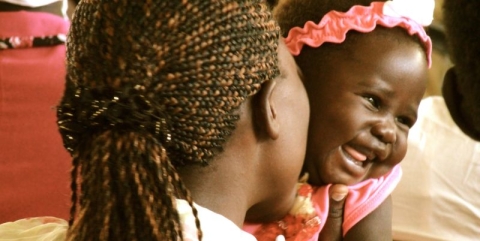
Babies as young as three months thrive if given gaps in conversation and play, and a clear ‘your turn-my turn’ structure, new research has found.
A small-scale study led by Dr Valentina Fantasia found even very young children engage better with their mothers when they are treated as part of the conversation, rather than being played ‘at’.
The study, published in Frontiers of Psychology, examined an existing study of healthy mothers and mothers with postnatal depression who were filmed interacting with their children.
Dr Fantasia carried out the research as part of her PhD studies at the University of Portsmouth. She is now a research fellow at La Sapienza University, in Italy.
She said: “Babies, even as young as three months, engaged more and for longer when the mother prepared their infant for play, paused between bouts of activity, and adapted their behaviour depending on the child’s signals, rather than providing endless activity and noise with no gaps for two-way communication.”
Dr Fantasia hoped to shed some light on what’s been described in mothers with postnatal depression as intrusive mothering.
“We emphasise this was a small and limited study, but it’s the first step towards acknowledging what science calls intrusive behaviour of a mother towards her infant is complex and we may need to re-think how we describe and study mother-infant behaviour,” she said.
We saw a clear difference in interactions between infants and their mothers that’s much more subtle than the word ‘intrusive’ implies.
Dr Valentina Fantasia , Former PhD student, Department of Psychology
“We saw a clear difference in interactions between infants and their mothers that’s much more subtle than the word ‘intrusive’ implies.”
She hopes better understanding could lead to improved clinical treatment for those with postnatal depression.
In the study, researchers examined filmed interactions between mothers with and without postnatal depression and their three-month-old babies. Although all the pairs did many similar things, including mothers talking to their babies or holding up toys for their babies’ gaze, the researchers saw differences in how mothers and babies interacted.
Well mothers were more likely to leave gaps during conversation and playtime with their babies, allowing space for the baby to respond. They also had clear opening and closing phases to their time together and behaved as if both the baby and mother could influence what happened next. These mothers also seemed attuned to their babies’ occasional need for physical space, backing off a little from time to time. Such mothers spoke to their children more and appeared to watch and listen for responses.
The mothers with depression were more likely to overwhelm their child with excessive stimulation and interrupt the child’s own activity, or change its course. They did not give their children space, continuing to stroke or poke the baby even when it appeared distressed by attention. These mothers also maintained a steady smiling expression that didn’t respond to changes.
It was as if the children of mothers with depression were the recipient of someone else’s activity, rather than taking part in a shared activity.
Dr Valentina Fantasia, Former PhD student, Department of Psychology
In addition, well mothers prepared their children for physical play by starting with small gestures, such as hand holding, and checking the baby’s reactions, before building gradually to larger gestures, such as lifting and pulling the baby away from its seat.
Mothers with depression started physical play with large gestures, such as lifting and pulling.
Last, well mothers and babies seemed to negotiate an end to play, with mothers mirroring their children’s slowing down of activity. Mothers with depression ended play sessions abruptly.
“It was as if the children of mothers with depression were the recipient of someone else’s activity, rather than taking part in a shared activity,” Dr Fantastia said.
She added that it was also possible mothers with depression might have found the experiment stressful and their behaviour could have been a reflection of trying hard to appear upbeat and engaged.
Interactions between a baby and its carer is believed to form the foundation of that individual’s social communication skills.
Postnatal depression affects about one in ten new mothers. The condition has been linked to children later struggling with emotional, cognitive and self-regulatory capacities.
